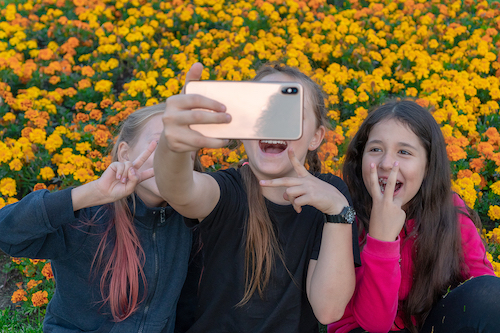 Teenagers spend a lot of time taking selfies.
Teenagers spend a lot of time taking selfies.
Many would argue this isn’t good for a teenager’s self-esteem. But a recent study of the habits of teenage girls who take selfies found that taking and distributing selfies on social media isn’t associated with poor body confidence.
But selfies can become a problem if teenage girls spend a lot of time debating what photo of themselves to share, or heavily editing photos before sharing.
“Based on decades of research on self-objectification, we know that women and girls who learn to perceive their appearance and bodies as objects for others to look at will experience negative effects on their self-esteem and body image. We wanted to test this critical idea -- are selfies, which are so commonplace in the digital lives of adolescents today, helping or hurting in terms of body image?” Jennifer Stevens Aubrey, senior author of the study and an associate professor of communication in the University of Arizona College of Social and Behavioral Sciences told Theravive.
“Taking and posting selfies was not related to body image among adolescent girls. But editing selfies and investing a great deal into selfies were problematic, as these variables were related to more self-objectification, body shame, appearance anxiety, and negative evaluations of their physical appearance,” she said.
In undertaking the study, the researchers looked at the responses of 278 teenage girls between the ages of 14 to 17. The girls were asked to complete an online survey and responded to questions regarding how often they share selfies to social media and how often they edit their selfies using photo editing tools. Some of the tools include removing red eye, making skin appear smooth or adjusting body size to appear thinner. The girls were also asked questions to assess how much effort and time they spent selecting the perfect selfie before sharing it on social media. The researchers referred to this as their “selfie investment”.
The girls also completed questionnaires related to their appearance concerns, and self-objectification.
For teenage girls in particular, self-objectification can be dangerous.
“Self-objectification is related to wholly negative outcomes. For girls especially, self-objectification is related to depression, eating disorders, and sexual dysfunction. It sets up a situation where people come to think of their bodies as products to be marketed to others. Just like a product that gets spiffed up in post-production, teens who use editing techniques likewise are learning that their appearance can be altered to be more pleasing to others in post-production,” Stevens Aubrey said.
The researchers say that it isn’t necessarily the act of taking selfies that is cause for concern, it is the time spent obsessing over the best picture to post, or editing pictures heavily that was a cause for concern. Editing selfies and spending a lot of time choosing them was associated with self-objectification. Girls who self-objectify were more likely to feel anxious about how they look or shame over their appearance.
Girls are more likely than boys to self-objectify, and they are also more likely to experience negative consequences of that self-objectification like issues with body image.
It is estimated 93 million selfies are taken every day, and this trend is unlikely to go away anytime soon.
The researchers say parents and caregivers of teen girls should be aware of signs that their teen’s selfie taking behaviour may be causing them harm. Selfie editing apps on their phones and a camera roll full of selfies may be signs the teen is obsessing over their selfies.
Parents and caregivers can have conversations with their teen early to ensure problems can be avoided. Conversations should focus on girls developing an awareness of themselves that is not dependent on how they look or how others perceive their looks.
“I would not be too concerned if the teen is taking and posting a lot of selfies, but if there is evidence that the teen is taking a lot of pictures to get one selfie, for example, a selfie fest on their camera roll, that would be cause for concern. The parent could intervene in this case and talk to the teen about why they are taking selfies. The emphasis of this conversation should be on encouraging teens to recognize their value comes from more than just their appearance,” Stevens Aubrey said.
“There's no need to worry about the simple act of taking and posting selfies. Enjoy sharing selfies! Just don't obsess.”
Elizabeth Pratt is a medical journalist and producer. Her work has appeared on Healthline, The Huffington Post, Fox News, The Australian Broadcasting Corporation, The Sydney Morning Herald, News.com.au, Escape, The Cusp and Skyscanner. You can read more of her articles here. Or learn more about Elizabeth and contact her via her LinkedIn and Twitter profiles.